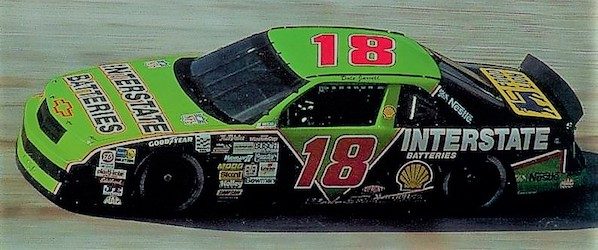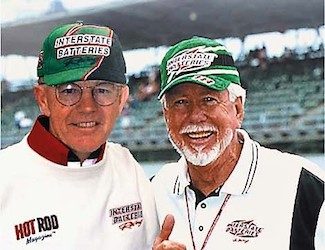Q: Greg, with the state of our economy looking down these days, how will this affect major league racing and the many sponsors that participate? I see fewer yearlong major sponsors in racing as there used to be years ago. I would think that’s okay, as many top NASCAR cars carry a sponsor’s name for six to 10 total races instead of a full year of over 30 races; then the race team can sell the other races to different companies.
What is your opinion of these sponsor matters and how it impacts the big race teams? Also, do the Wall Street ad agencies still participate in negotiating big deals in racing? John G., a big race fan living near Watkins Glen, N.Y.
A: John, this is a great group of questions. I am happy to give my input. You are correct in your understanding of what is going on these days with sponsors in major league racing. Wall Street still plays a role as many of the racing’s top corporate sponsors, in all shapes and sizes, include Wall Street help and input.
However, Wall Street mismanagement and market manipulation will one day come home to roost and I feel we might be on that doorstep right now.

When Joe Gibbs won the Daytona 500 with driver Dale Jarrett in 1993; his major sponsor was Interstate Batteries, one of his founding sponsors from 1991 forward. To this day Interstate still plays a role in sponsoring Gibbs team cars. (Gibbs Racing photo)
Granted, Fortune 500 companies and the auto racing teams involved want to deliver consumer impressions at the cheapest cost per thousand, and racing indeed delivers this ingredient in aces. Yet no sport is more reliant on sponsor dollars than professional motorsports, which is why I’m a bit worried at this stage. This is proven by the fact that modern day race teams are now gigantic, “money addict” operations in search of the next cash “fix,” usually from the one and the same publicly owned companies run by the Wall Street “pros” we’ve come to distrust.
Many of today’s sponsor deals are put together without any Wall Street Ad Agency input. Most notable is when a team owner is friends with a major business concern, like Interstate Batteries owners Norm and Tommy Miller and Joe Gibbs, along with Bass Pro Shops CEO Johnny Morris being good friends with driver Martin Truex Jr. and Gibbs. Yuengling Beer and Childress Racing is another good example of race teams dealing directly with company owners. (I remember when Richard Childress was in Pottsville, Pa. with his grandson Ty and dealt with Dick Yuengling personally.)
I can go back as far as when J.D. Stacy sponsored numerous NASCAR cars from 1977 to 1983, thanks to his millions made as a coal baron. I also remember a unique sponsorship that had to do with an all-stock deal (no money) in trade for a full season of race car branding (Ted Musgrave driver; Jack Roush owner; stock from Family Channel, then the new TV effort). I learned a lot about sponsors back then, including the best to the worst of which neither Stacy nor the Family channel deals were not in the “worst” category.
In my experiences, some of the most enduring sponsors came without Wall Street ad agency assistance, but not everyone was so lucky.
As for the noted ad agencies on Wall Street, many sponsorships are still put together in this manner as agencies many times have millions of dollars to work with and can divvy monies over to auto racing and other sport concerns. Included are direct car sponsorship and / or sanctioning body racetrack signage or actual races named for a sponsor product, i.e. Coke Zero 400 at Daytona.
Even though things have stayed pretty much the same for decades; most every pro team has a full-timer employed that seeks sponsorship. This is because if everything were left up to Wall Street alone, there would be lots of team owners that wouldn’t like how things were handled or just be forgotten.
For full disclosure, I have been in the big ad agencies and even represented a few smaller programs as an unpaid consultant (couldn’t take money if I wanted to be an objective racing writer), but I did allow the New York City agency to buy my lunch when I was there in person. (LOL.)
However, racing and the Wall Street stock market are, in many instances, married to each other and the success of one depends on the success of the other. When the stock market is booming, there is usually more money to go around as opposed to when the market drops and is gloomy. In bear markets, many of the racing and sport-oriented deals dissolve quickly.
Concurrently, I have this impending bad feeling that if the corporate Wall Street types keep manipulating prices (as they have done in the past), racing will become an expendable afterthought and some major sponsor monies will disappear, regardless of contract durations, options or guarantees.
As an example of “screwing things up,” I recall many a Wall Street “rookie” rep not having any idea how a successful sponsorship is supposed to work. In professional motorsports, the owner and his team use sponsor branding first to deliver a consumer message to the fan / viewer and move product out the door via increased sales; second, to pay all the bills in cooperation with winning prize money; and third, to gainfully employ team members both on and off the track. Major sponsors do not share in the prize money.
However, to participate with the big boys, Wall Street types often come into play, especially when $25-million NASCAR sponsorship deals are signed. This is when a Wall Street trained “PR” (public relations) person comes along with the big money deal to help “interact.” These people right away know more than Childress, Hendrick, Petty, Penske, or Roush. Fortunately, the pro race teams smartly employ their own PR people who learn to meld or train these inept individuals. Granted, when big money is involved, a fair amount of brown nosing comes with the deal.
Still, most race teams feel it’s worth the downside of dealing with some of these “executive” people, as racing is still the most exciting sport of all. I don’t care if you’re running a John Force Chevy Funny Car, Penske Ford Cup car or a Cadillac Prototype sports car; it’s all great to this scribe.
I’ve got my fingers crossed but don’t feel very confident lately in the strength of our financial partners.
Thanks for the question John, and I haven’t even touched on the demands of the drivers and team when it comes to public appearances, sponsor demands and corporate entertainment. Perhaps one day we’ll explain more.
(Greg Zyla is a syndicated auto columnist who welcomes reader questions and input on collector cars, motor sports and auto nostalgia. Write to him at greg@gregzyla.com.)



Be the first to comment on "Collector Car Corner/Cars We Remember; Auto racing sponsors and Wall Street; sometimes a necessary marriage"